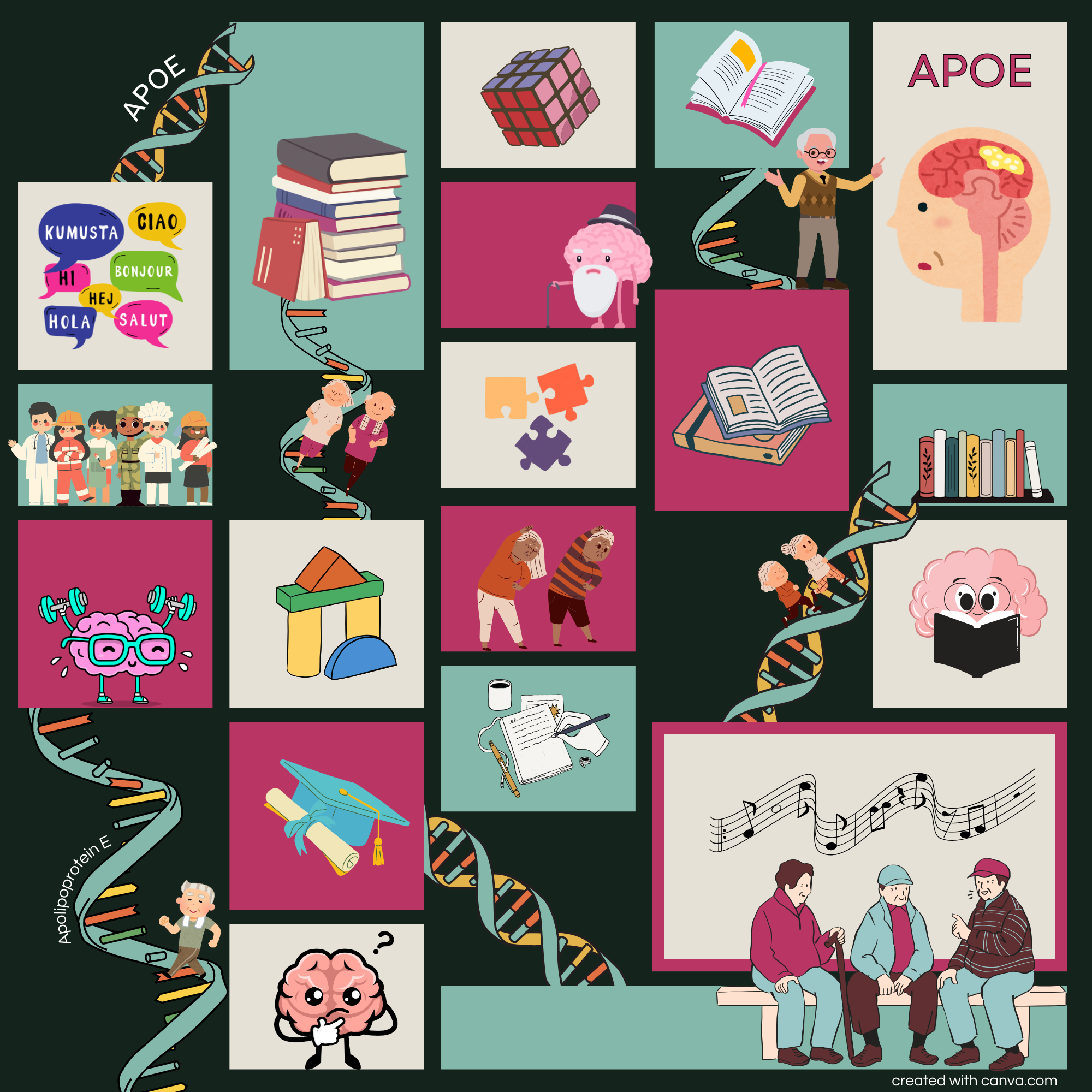
L'allèle ε4 de l'apolipoprotéine E (APOE) est un facteur de risque génétique majeur pour le développement cognitif pathologique chez les personnes âgées. Potentiellement pertinent à cet égard, le concept de réserve cognitive (Stern, 2002 ; Stern et al., 2020) postule que les expériences vécues tôt et tout au long de la vie, y compris les résultats scolaires et professionnels, et les activités de loisirs tout au long de la vie, déterminent la capacité de l'individu à faire face aux pathologies cognitives. Cependant, la recherche sur les caractéristiques et facteurs interindividuels différents tout au long de la vie qui modulent les voies d'accumulation des réserves cognitives et leur rôle spécifique dans la gestion du développement cognitif pathologique lié à l'APOE n'en est qu'à ses balbutiements. Il est indispensable d'adopter une perspective fine du parcours de vie pour comprendre en profondeur l'interaction des voies individuelles d'accumulation des réserves cognitives avec les facteurs contextuels et les événements majeurs de la vie qui surviennent au cours de la vie d'un individu, ainsi que le rôle de ces mécanismes dans la capacité de l'individu à faire face au développement cognitif pathologique lié à l'APOE à un âge avancé et dans les trajectoires des résultats connexes tels que le bien-être au cours de cette phase pathologique.
Pour répondre à cette question ouverte fondamentale dans la recherche sur le vieillissement cognitif et le parcours de vie, ce projet de recherche exploitera, en trois sous-projets, des ensembles de données interdisciplinaires longitudinales à grande échelle disponibles en utilisant des techniques de modélisation avancées telles que les analyses de séquences, les analyses de transition latente, les modèles de courbe de croissance, les modèles à effets mixtes, les modèles conjoints et les approches de modélisation par équations structurelles dynamiques.
- Dans le sous-projet A, nous étudierons comment les facteurs contextuels, tels que les caractéristiques démographiques, économiques et sociétales des environnements dans lesquels un individu a grandi et a passé sa vie adulte, influencent en détail l'accumulation des réserves cognitives et comment cela affecte finalement la capacité de l'individu à faire face au développement cognitif pathologique lié à l'APOE plus tard dans la vie. Une attention particulière sera accordée aux effets différentiels en fonction du niveau contextuel (pays ou État fédéral / région ou quartier) et de la phase de vie spécifique au cours de laquelle l'environnement respectif peut affecter les trajectoires individuelles (début et fin de l'enfance, adolescence, jeune âge adulte, début et fin de la quarantaine, fin et très grande fin de l'âge adulte).
- Dans le sous-projet B, nous examinerons comment les événements majeurs de l'histoire de vie de l'individu influencent en détail l'accumulation des réserves cognitives et comment cela affecte finalement la capacité de l'individu à faire face au développement cognitif pathologique lié à l'APOE à un âge plus avancé. Une attention particulière sera portée aux effets différentiels selon le type d'événement (positif ou négatif) et la phase de vie spécifique au cours de laquelle la période d'événement respective peut affecter les trajectoires individuelles.
- Dans le sous-projet C, nous étudierons comment l'interaction détaillée des voies fines d'accumulation des réserves cognitives avec les facteurs contextuels et les événements majeurs de la vie survenant au cours de la vie d'un individu influencent en détail les trajectoires des résultats connexes tels que le bien-être face au développement cognitif pathologique lié à l'APOE à un âge avancé. Une attention particulière sera accordée aux effets différentiels en fonction du niveau contextuel, du type d'événement et de la phase de vie spécifique au cours de laquelle l'environnement et la période d'événement de vie respectifs peuvent affecter les trajectoires individuelles.
La présente proposition interdisciplinaire revêt une importance conceptuelle considérable, car elle contribuera à affiner les modèles actuels de réserve cognitive tout au long de la vie en particulier et la recherche gérontologique en général. En outre, elle sera d'une importance capitale pour les politiques de prévention sociale et pourra jeter les bases de la conception de programmes d'intervention fondés sur des données probantes pour nos sociétés vieillissantes.
Lien utile
Page du projet sur le site du FNS


